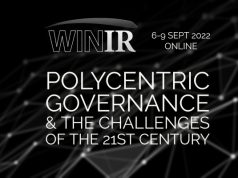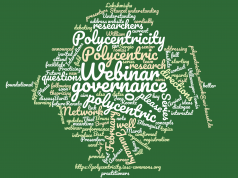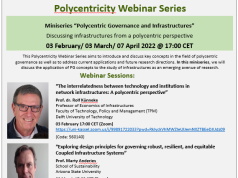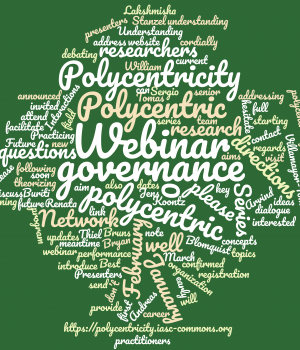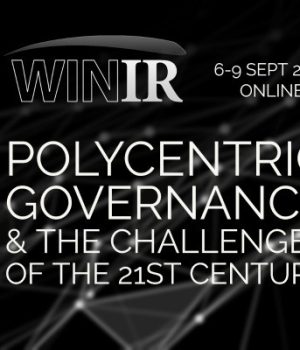Call for papers for WOW6, 19 – 22 June 2019, Indiana University, Bloomington, IN, USA https://ostromworkshop.indiana.edu/resources/news/171212-wow6-save.html
Frontiers on Researching and Understanding Polycentric Governance
Polycentricity offers significant potential to deal with the governance challenges facing society in the 21st century, including climate change, information sharing, water scarcity, and other problems that require collective action and coordination across multiple sectors, jurisdictional boundaries, and governance levels. Theoretical and empirical work on polycentricity has exploded in recent years, and scholars have begun to articulate why and how polycentricity can be an effective approach, particularly in managing common pool resource regimes. Yet, if polycentric governance is to realize its potential in helping society manage complex problems, we need to broaden polycentricity scholarship into new areas. More research is also needed to ascertain what specific types of polycentric systems may help global, national, and subnational actors pursue their goals under varying social, economic, political, and ecological/environmental conditions. Thus, we invite scholars whose work lies at the frontiers of polycentricity research to submit proposals for four polycentricity-themed sessions at WOW6. We are particularly interested in research that fits one of the following areas:
Theme 1: Expanding application of the polycentricity perspective. To date, much of the research on polycentric governance regimes has focused on common pool resource regimes such as irrigation, forestry, and fisheries. However, polycentricity has potential to improve governance not only within natural resource commons, but in other policy areas where solutions require coordination and collective action across jurisdictional boundaries, sectoral boundaries, or governance levels. In this session, we seek papers that innovatively examine polycentric governance or apply polycentric perspectives to additional fields and policy areas.
Theme 2: Polycentricity as an Ecosystem of Institutions. Polycentricity constitutes a relatively distinct approach in so far as it emphasizes the structures and networks that link multiple levels of governance without the imposition of a top-down hierarchy. Even so, any polycentric governance arrangements would have to contend with an entire ecosystem of institutional conditions and a plurality of interests, aspirations, and strategies that various actors and agencies bring to the table in an “ecology of games.” The complexity and multi-scale nature of polycentric arrangements make it even more important to dig deeper into the conditions that shape the development, design, functioning, and outcomes of polycentric governance systems. Some of the important lines of inquiry that require attention at this stage include the following: What role do (or could) some of the highly salient non-polycentric systems (e.g., international institutions and national governments) play in polycentric systems? What are the distributional consequences of the planetary scale polycentric governance systems related to climate and environmental change? What preconditions and processes influence the extent to which polycentricity addresses the questions of social and environmental externalities and equity? We seek to develop the essential conceptual foundations of polycentricity with the intention of fostering positive research on this increasingly ubiquituous concept.
Theme 3: Evaluating performance of polycentric regimes. While many scholars have posited that polycentric governance can be effective in governing complex environmental problems, we have limited empirical evidence about the performance of polycentric regimes; and methods for evaluating performance of polycentric resource regimes are in the early stages of development. In this session, we seek papers that evaluate polycentric governance regimes or that develop conceptual or empirical methods to evaluate their performance.
Theme 4: Promoting Polycentricity: Whether, when, and how? Polycentricity is not a panacea, and polycentric governance encompasses a rich diversity of possible institutions, which may also incorporate centralized hierarchies and decentralized local self-governance. This session seeks to explore examples and concepts for understanding how governments and other organizations might promote polycentric governance, and the larger questions of institutional design for appropriate combinations of autonomy and institutions for mutual adjustment.
For consideration in one of these sessions, please submit a 250 words abstract to agrargovernance@uni-kassel.de by August 6, 2018. Please, indicate with your submission which theme you want to submit for. Panel organizers will select among submitted abstracts and configure one or several panels on above issues. The panel organizers may facilitate sharing of recent or draft papers related to the session topics, as inputs for authors to consider. Sessions will include prepared remarks by a discussant. To ensure a high quality session, we expect that participating presenters will submit a finished paper by May 15, 2019.
Panel organizers: Dr. Elizabeth Baldwin, University of Arizona School of Government and Public Policy, Tucson, Arizona; Dr. Prakash Kashwan, University of Connecticut Department of Political Science, Storrs, Connecticut; Dr. Andreas Thiel, International Agricultural Policy and Environmental Governance, University of Kassel, Germany; Dr. Bryan Bruns, independent scholar






